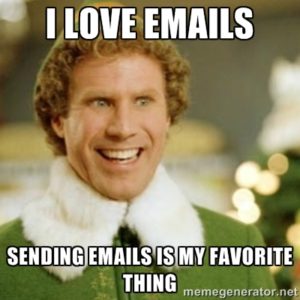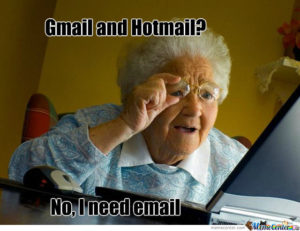Sending emails is one of those things that you either love or hate. I happen to love checking my email, and I find it really satisfying to see zero new messages.
 My mom is the same way; she’s very prompt and timely with her email responses. However, I have many friends and family members who shall remain unnamed, who let their emails pile up for months and months, and never end up getting to them. They have the dreaded “two thousand six hundred and forty two” number in their inbox, and a stream of spam mail that never seems to end. This. Is. My. Worst. Nightmare.
My mom is the same way; she’s very prompt and timely with her email responses. However, I have many friends and family members who shall remain unnamed, who let their emails pile up for months and months, and never end up getting to them. They have the dreaded “two thousand six hundred and forty two” number in their inbox, and a stream of spam mail that never seems to end. This. Is. My. Worst. Nightmare.
I absolutely hate letting emails sit in my inbox, unattended to. In fact, I actually obsessively check my emails, multiple times a day. If I had to guess how many times I do so, I would guess roughly around 10-15 times a day. Admittedly, this is a bit excessive.
I think my love reading and responding to emails stems from the fact that I love checking off list items. It makes me feel less anxious when I can see that I completed a task. Marking an email as “read” seems like I am completing something. I also think that checking emails serves as a form of procrastination for me, because often when I don’t want to start studying for a stats quiz (which is the case as I type this) or when I don’t want to finish a final paper (also the case right now) I check emails because somehow it still feels productive. Not allowing emails to pile up also makes me feel more in control of work and school, because it means that I am taking on tasks as they come rather than letting them get out of hand.
The good news for me, is that most jobs require one to check emails somewhat regularly. However, I do think my hatred of “unread messages” could also indicate some of my school and workplace flaws: I sometimes prioritize small, concrete, logistical tasks in place of more important long-term tasks. In addition, I also think I need to learn how to leave things unread, both literally and figuratively. In other words I need to be able to sit with the anxiety that comes with being a little less rigid in some areas of my life.
Another piece of good news is that even though many jobs require sending many emails a day, not all do, and if you’re someone who hates the thought of even having to press the “send” button more than once a day, than perhaps you can find a job that is light on email-sending. Or in the case of someone like me, you could try to find a job that is mostly comprised of sending emails, but that contains zero spreadsheets or calculations, which are words that send my mood plummeting.
As with anything in life, it is good to set manageable goals. Right now, one of my goals is to check my email less—perhaps 5 times a day instead of 15. For many people, checking emails is an evil necessity, but I hope to convince others that it is actually a very wonderful source of procrastination.






